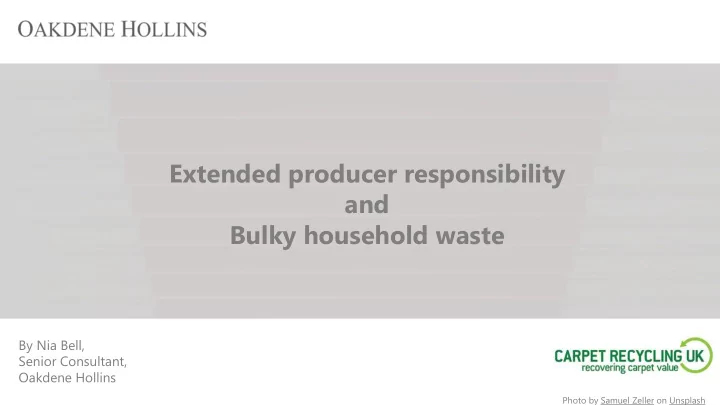

Extended producer responsibility and Bulky household waste By Nia Bell, Senior Consultant, Oakdene Hollins Photo by Samuel Zeller on Unsplash
Outline 1. Extended Producer Responsibility – quick overview 2. Why carpets and why now? 3. Timeline and considerations
EPR E xtended Beyond the warranty period, through to End of Life P roducer Obligation usually split across supply chain (e.g. raw material, import, production, and retail) R esponsibility Financial or physical, and can include communication as well as data and reporting requirements
Why carpets? Carpets are a significant proportion of bulky municipal waste Kerbside bulky waste arisings HWRC bulky waste arisings Mattresses = 16.1% Underlay = 1.6% Ref: Composition of kerbside and HWRC bulky waste, WRAP 2012
EPR What can EPR be used for? 1. Reducing the environmental impact of products, especially at their End of Life 2. Generating socio-economic benefits through product value retention and job creation 3. Reducing the financial responsibility on local or central government What does the UK Government want to use it for? To ensure that: “Producers [, not Local Authorities,] bear the full net cost of managing their products at the end of their life”
Wider policy env. Waste policy evolving from mass to impact Improving coherence across policy based interventions instruments: incl. mixture of carrot and stick Mass: Mass: recycling & landfill tax recovery targets in ELV EPR 1990s 2000s 2010s 2020s Impact: Impact: Impact: plasterboard right to landfill ban on landfill ban repair for biodegradable electronic municipal waste equipment
Timeline “By the end of 2025, the UK Government will have reviewed and consulted on measures such as EPR for five new waste streams, two of which we plan to complete by 2022 [and one of which is bulky waste, including carpets.]” 2019 2020 2021 2022 2023 2024 2025 Reviewing and consulting on measures such as EPR and Building of the product standards for 5 new evidence base to waste streams, 2 of which support a consultation will be complete by 2022 on EPR for bulky and [incl. bulky waste] Reviewing and consulting on EPR for construction waste textiles, tyres and fishing gear
What now? We will be working for DEFRA on building the evidence base for EPR schemes on bulky and construction wastes over the next 6 months. 10 construction Assessment of Scope: waste products the suitability of Market data • products to be In-use profiles • tackled through Current EoL situation • different policy Trends in EoL treatment 10 bulky waste • instruments Financial and ‘other’ costs of status -quo products • Identify ‘kindred’ products, i.e. products that could be tackled together within a single EPR scheme or other policy intervention
What can you do? 1. Engage with our evidence building efforts to ensure that the outputs reflects the realities of the sector: - building a strong foundation for the public consultations that are to follow 2. Proactively demonstrate transparency, collaboration and product stewardship: - EPR is a way augment, not replace, voluntary industry led efforts 3. Prepare for the future state: - Shift in policy environment could present opportunities as well as challenges
Speaker information: Nia Bell , Senior Consultant nia.bell@oakdenehollins.com Head Office: Oakdene Hollins, Ardenham Court, Oxford Road, Aylesbury, HP19 8HT, UK Brussels Office: 37 Square de Meeus - 4th floor, 1000 Brussels, Belgium.
Recommend
More recommend